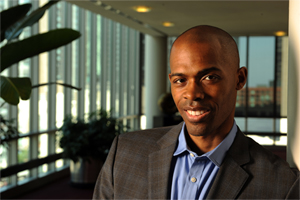Happy is healthy
Medical journalist Ian Smith uses past experience to inform his book on happiness.
By Ruthie E. Kott, AM’07
Photography by Dan Dry

While a personal-health columnist for Time, Smith became a self-taught nutrition expert.
Ian Smith, MD’97, saw what unhappiness was in his third year of medical school. Until then, he’d thought he wanted to be a neurosurgeon. “I’ve always been a very ambitious person,” he says. But during his neurosurgery rotation, he noticed that the surgeons seemed pretty miserable.
“They just didn’t have regular-people conversation,” says Smith. Instead they complained constantly about long hours, missing their families, and not having time to do things outside the hospital. “It was all related to work.” Smith’s ambition wasn’t that single-minded.
He switched his focus, first to orthopedic surgery and then to physical medicine and rehabilitation, giving him more time to pursue other professional interests, primarily medical journalism, and to be with his family and friends. He found his passion in journalism, writing about health and nutrition for publications including Time, Newsweek, and Men’s Health. He’s also been a medical correspondent on NBC’s Nightly News, The View, and Rachael Ray. Named in June to President Obama’s Council on Fitness, Sports, and Nutrition, he was a medical journalist “way before the Sanjay Guptas of the world.”
Smith, who earned his bachelor’s degree from Harvard, had realized that “there is more to life than medicine, and more to life than your career, actually.” This perspective has informed his career and his personal choices. Part of being content, he writes in his 2010 book Happy: Simple Steps to Get the Most Out of Life (St. Martin’s Press), is dedicating time to what he wants to do, whether it’s spending time with his wife and two young sons (the older of whom starts at the University’s Laboratory Schools this fall) or reading a good book. He particularly likes detective series and wrote a 2004 thriller, The Blackbird Papers (Doubleday). “I made decisions based on what felt right for me: what engaged me, what felt meaningful, and what brought me joy,” he says. “And those are, I think, the three principles of happiness.”
Applying positive-psychology research, which focuses on what gives people sunny dispositions, Happy offers tips and suggestions on how to increase satisfaction in life (see Open Book). Smith includes stories from his past, such as how advice from his grandmother—“It is what it is. Now we move on”—helped him develop a sense of optimism and self-confidence from a young age, in spite of his father’s walking out on the family when he was a toddler.
For Smith, staying happy involves something that doesn’t come naturally to him: saying “no.” Doing things he wants to do can mean declining events or meetings that crowd his schedule. With seven books published and two more in the works, a nationally syndicated radio show and TV appearances, and flying hundreds of thousands of miles a year to appear at events, it’s hard to imagine he refuses anything. Yet one of his personal assistant’s biggest jobs, he insists, “is to say ‘no.’”
One time Smith said no immediately, on his own, was in 2004. A producer e-mailed him about joining the expert panel for Celebrity Fit Club, a VH1 show that organizes fitness and nutrition regimens for overweight D–Z-list celebrities. The show had aired for one season. He didn’t want to be a part of it. “After all these years building my credibility,” he recalls, “here was a show where people were wearing their pants around their ankles, cursing at each other, fighting.”
His wife, Triste Lieteau, JD’97, convinced him to reconsider. If producers were willing to commit to making the show more serious, she said, and if the cast was going to respect him as the medical and diet expert, then he had nothing to lose. He decided to give it one season, “and I guess the rest is history,” says Smith. He’s been the dietician on the show for six seasons now. The commitment, he says, is probably four or five hours a day over the course of two months of shooting time.
He’s also brought weight-loss goals to a wider population. In April 2007 he launched the 50 Million Pound Challenge. A response to the obesity health crisis, the national health initiative tracks how much weight people lose by exercising and eating well. He and other experts had been sounding the alarms for years, “but no one was paying attention to us.” More than 1.5 million people have signed up, he says, and have lost a cumulative total of 5.7 million pounds.
He came into nutrition by accident. As a personal-health columnist for Time in the late 1990s, he was inundated with questions about food, healthy eating, weight loss, and supplements. At the time, doctors weren’t trained in nutrition. “I had to teach myself,” he says. “I had to go back and buy textbooks and…learn about what nutrition is and what it means.” He’s since published four diet books.
But he has goals beyond diet books: “I’d like to tie the weight-loss journey into the bigger journey of life.” His recent book on happiness, for example, ties in with his work on weight loss and health. “The happiness quotient,” he says, “is interwoven in everything that we do.” When people struggle to lose weight, they’re often unhappy in relationships or at work, or they don’t think they’ve been productive enough. They become emotional or stress-related eaters. “In general,” he says, “when people say they want to be healthy, I think what they’re also saying is they want to be happy.”
